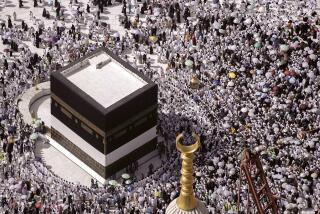Some Egyptians can’t help but feel sorry for Mubarak
- Share via
Reporting from Heliopolis, Egypt — As the wild celebrations of a new beginning continued Saturday in Tahrir Square, the atmosphere was decidedly more subdued seven miles away near the Heliopolis Sporting Club and President Hosni Mubarak’s former official residence.
To be sure, there were some in this wealthy Cairo suburb who were ecstatic. A few who waved large Egyptian flags from their car windows as they passed through the wide tree-lined boulevards planned by a Belgian baron a century ago.
But there was none of the horn-thumping taking place in the central square that had been the heart of the revolt against Mubarak. Though many were reluctant to talk, some admitted to sadness.
“I’m not glad about the way he’s been put out,” said pharmacist Sandra Nabil. The Aruba Palace, built in 1910 as Africa’s grandest hotel and which now serves as the presidential residence, is two blocks from her shop. “It’s not polite. He served the country for years.”
Nabil said she resented “foreign interference,” an apparent reference to the United States, but was still hopeful for Egypt’s future.
Haitham abu Fatah said he saw little reason for hope. He was bitter about losing his job in the tourist industry because of the demonstrations, and now serves tea and coffee in a cafe.
“This is all nothing, and no rights will come of it,” he said bitterly. “We are living in poverty, and we will never be the same.”
A 45-year-old man who identified himself only by his first name, Rida, said he was born in the same area of Egypt as Mubarak. He said the president’s departure “hurts me deep inside.”
“I loved Hosni Mubarak and wanted him to stay, and I am so sad for him,” Rida said.
Many of the wealthy patrons of the Heliopolis Sporting Club, which offers squash, water polo, cricket and tennis, may have supported Mubarak. But Ghada Howaidy, an administrator at the American University in Cairo, and her husband, Mamdouh Halawany, a dentist, went to the club Saturday with their young daughter in a celebratory mood.
“This is the best thing that could have happened,” said Halawany, 52. “He stayed 18 years more than he should have,” he said of Mubarak, who ruled for 30 years.
Howaidy said she had no fear of the army. “We are very confident about the future,” she said.
On Ibrahim al Laqani Street, where fancy shops sell Western clothes in old-fashioned three-story buildings of Arabesque design, Abdul Aziz Nabil was walking a large shaggy dog on a leash, a rarity in a country where most dogs on the streets appear to be starving.
The recent university graduate said that opinion in Heliopolis, named for the ancient Greek city nearby, was mixed.
“Some people went into a coma from sadness, and some went into a coma from happiness,” Nabil said. He said he spent some of the last 18 days demonstrating against Mubarak in Tahrir Square.
“The president did some bad things, but everybody makes mistakes,” said his friend, Ebran Emad, 20. “We didn’t have to treat him this way. But if everything they say really happens, that will be great.”
More to Read
Sign up for Essential California
The most important California stories and recommendations in your inbox every morning.
You may occasionally receive promotional content from the Los Angeles Times.














